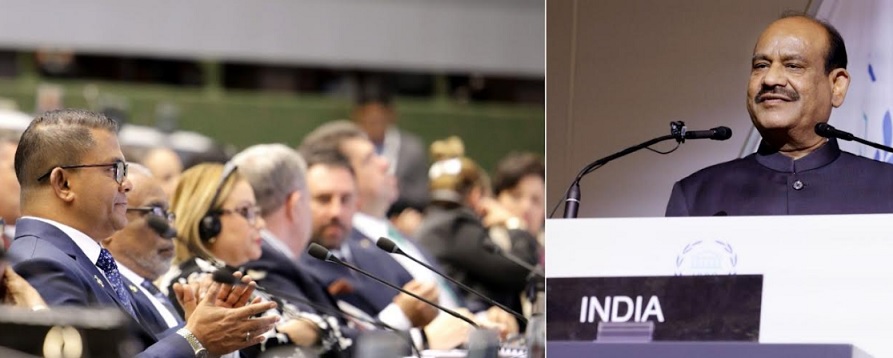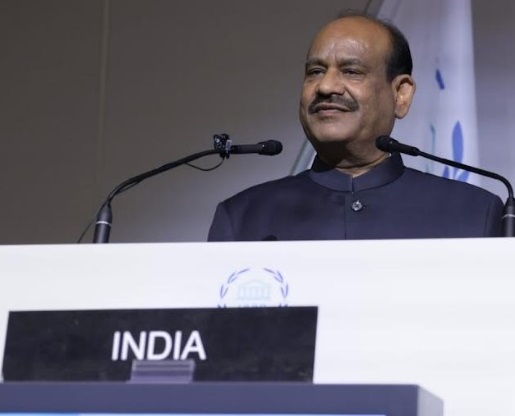Last Updated on October 14, 2024 6:13 pm by INDIAN AWAAZ
AMN / Geneva
Emphasizing that India has always been a strong proponent of multilateralism, Lok Sabha Speaker Om Birla said that dialogue and cooperation amongst Parliaments in the field of science, technology and innovation was vital for common good. Om Birla, who is leading an Indian Parliamentary Delegation to 149th Assembly of Inter-Parliamentary Union (IPU) in Geneva, was addressing the Assembly on the theme “Harnessing science, technology and innovation for a more peaceful and sustainable future.”, today.
He expressed hope that through the forum like the IPU, Parliaments would be able to pave the way for inclusive development in the world through shared action plans and joint efforts. He was unequivocal in stating that the collective endeavour of Parliaments across the world should be to in place to ensure fair and equitable distribution of the benefits of science, technology and innovation in the world. He called for convergence of technological advancements, scientific research and innovative approaches so that the fruits of such advancements were shared equitably and leveraged responsibly to build a future that is inclusive, resilient and peaceful.
Speaking on climate change and energy security, Birla referred to the idea of ONE SUN, ONE WORLD, ONE GRID – “OSOWOG”, initiated by Prime Minister, Narendra Modi. In the last decade, India’s renewable energy capacity has increased from 76 GW to 203 GW, he added. He also spoke about the initiatives like Green Hydrogen Mission, International Solar Alliance, Bio-Fuel Alliance underscoring India’s commitment to address climate change. Mentioning the steps taken by the Parliament in this regard, he noted that the issues of climate change and Sustainable Development Goals had been discussed at length in Parliament. He also noted that utmost use of green technology had been ensured in the construction of the new building which speaks of our commitment to green energy.

Mentioning about India’s thrust on science, technology and innovation, Birla noted with pride that India had given special incentives to innovation, technology and entrepreneurship under Start-up India programme. With 118 Unicorns, with valuation of more than US $ 355 billion, India had become the third largest start-up nation in the world, he added. Referring to India’s unprecedented use of technology for delivery of public services, he illustrated how digitisation of financial services and financial inclusion through JAM Trinity of Jan Dhan, Aadhar and Mobile financial benefits of 2 trillion 495 bllion INR had been transferred through DBT-Direct Benefit Transfer to the bank accounts of beneficiaries under 314 public welfare schemes, ensuring transparency and accountability in governance.
Stressing on the need for an appropriate regulatory system in the field of technology, safeguarding data privacy of citizens, ensuring proper use of AI and equitable sharing of the benefits of technology, Lok Sabha Speaker urged that such pressing issues needed to be discussed in the IPU forum as well as in national Parliaments. In this regard, he informed that the Parliament of India had held extensive discussions in the past few years and passed several bills related to technology, science and environment such as The Digital Personal Data Protection Bill, The Telecommunications Bill, The Energy Protection Bill, and The Biological Diversity Bill amongst others. He also informed that the Digital Parliament Application in the Parliament of India has not only made the Parliament paperless but also enhanced the efficiency of the Parliament by using Information Technology and Artificial Intelligence (AI). It has brought all the Members, all the Ministries of Government of India and all the stakeholders on a single integrated platform.
The IPU is the global organization of national parliaments. It was founded in 1889 as the first multilateral political organization in the world, encouraging cooperation and dialogue between all nations. Today, the IPU comprises 180 national Parliaments and 15 regional parliamentary bodies. It promotes democracy and helps parliaments develop into stronger, younger, greener, more gender-balanced and more innovative institutions.
Story is edited by Andalib Akhter

